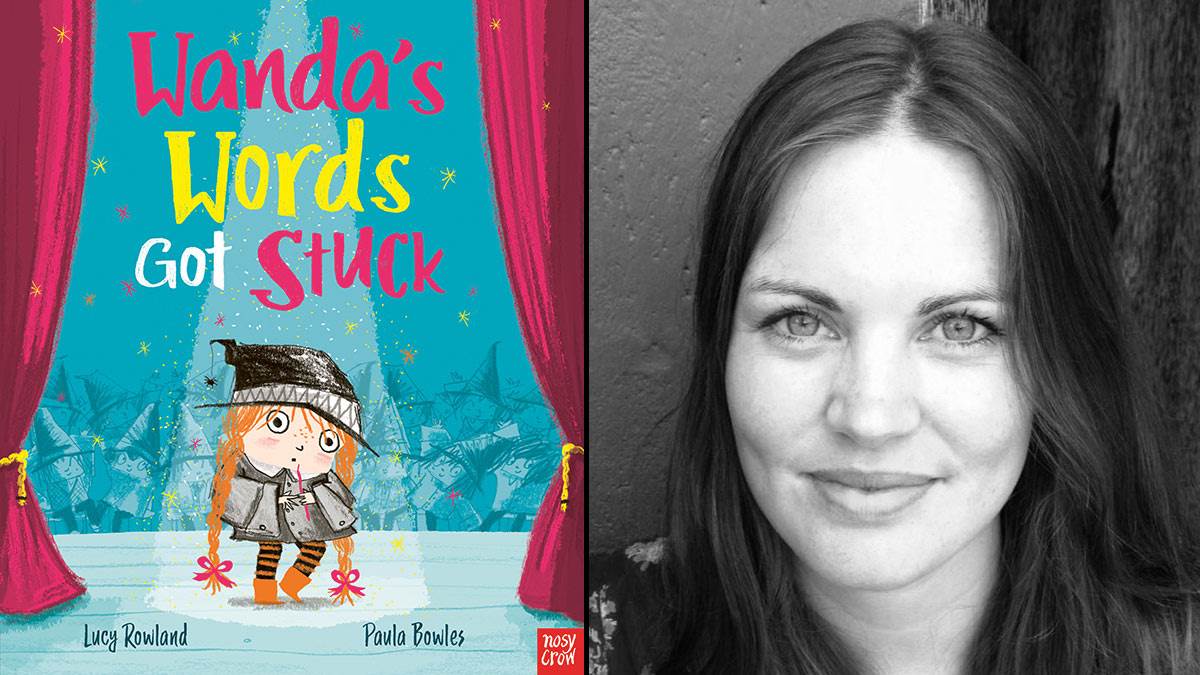Wanda's Words Got Stuck: Writing for children who struggle to find their voice
Published on: 04 January 2021 Author: Lucy Rowland
Working as a speech and language therapist, writer Lucy Rowland realised that there were very few books about children who have communication difficulties. She tells us why she decided to write her story Wanda's Words Got Stuck, our Bookmark Book of the Month.

My jobs have always involved children and language. I've worked as a nanny and childminder, an EFL teacher - teaching children English as a foreign language during summer school - and, for the past seven years, I've also written picture books for children.
My degree, however, was in Speech and Language Therapy and I've now worked in the Lewisham Children's Speech and Language Therapy Service for ten years.
In my experience, people who haven't come across Speech and Language Therapists before are often unsure exactly what it is we do. Some people think we give elocution lessons (we don't!) Other people think of films such as The King's Speech and might, therefore, consider our role is supporting people who stammer. But the truth is that Speech and Language Therapy encompasses an enormously wide range of work.
Therapists who work with children support early play skills, attention and listening skills, understanding and use of spoken language, speech sound development and articulation, voice, fluency of speech and social communication skills, as well as assessing and supporting feeding and swallowing.
The children we work with might have learning difficulties or physical difficulties. They may have a diagnosis of Autism Spectrum Disorder or Down's Syndrome. They may have a cleft palate, a stammer or a hearing impairment. They might have Selective Mutism or DLD (Developmental Language Disorder).
Speech and Language Therapists work in a wide range of settings, too - hospitals, community clinics, mainstream schools and special schools, Children's Centres and nurseries, courtrooms and Young Offender Institutions as well as in families' homes.
They work with children and young people themselves, and they also work with the people around them, such as teachers, teaching assistants, parents, carers and other family members, in order to enable and empower them to best support their children's needs.
Raising awareness of Developmental Language Disorder
One of my more recent Speech and Language Therapy roles was supporting children who have a diagnosis of Developmental Language Disorder (DLD) - they attended a Language Resource Base, which was attached to a mainstream primary school.
Developmental Language Disorder is a lifelong diagnosis affecting children's and adults' abilities to understand and use spoken language. It is a 'hidden disability', so it may not immediately be obvious if a person has DLD. As a result, many children and young people go through school without having their needs identified and without being given the correct support.
It is estimated that in every classroom, there will be approximately two children who have DLD, but it's not yet a diagnosis that is widely recognised or understood. But Speech and Language Therapists are trying to change that! We recently held a DLD awareness day - you can search for more information online by following the hashtag #DLDSeeMe or by going to www.RADLD.org (Raising Awareness of Developmental Language Disorder).
My time in the Language Resource Base was so special to me because I got to work very closely with the class teacher and we could support the same small group of children for the whole year. We got to know the children and their strengths and needs very well and it really cemented for me just how fundamental communication skills really are.
On a daily basis, I saw the huge impact that difficulties with communication can cause. Children with SLCN (Speech, Language and Communication Needs) can have difficulties making themselves understood, expressing their thoughts and feelings, understanding others, making and maintaining friendships, negotiating conflict, reading, writing and accessing the curriculum (much of which is delivered through spoken language).
SLCN can impact on children's feelings and behaviours too, with some children feeling anxious, isolated, frustrated or angry.
Writing about children with speech, language and communication needs
Often when children are experiencing particular difficulties, feeling strong emotions or going through new situations, we use books as tools to guide and support them through these challenges.
There are books about starting school. There are books about feelings. There are books about loss and grief. But, as a picture book author as well as a Speech and Language Therapist, I have not come across that many books about children or characters with SLCN.
That was one of the main reasons that I decided to write Wanda's Words Got Stuck. This story - illustrated by Paula Bowles and published by Nosy Crow - is about a little witch called Wanda who has difficulties talking and who feels very anxious about speaking in class.
I didn't really write the book with any one particular communication diagnosis in mind. Our little Wanda could have Selective Mutism. Perhaps she has DLD and has a reduced vocabulary, finding it hard to express herself in sentences? She might have a stammer where her words get stuck and don't come so easily, or perhaps she is just very anxious and shy about talking in class?
Either way, I knew I wanted to write about a character for whom talking is 'tricky', for whom words are 'sticky'. And, drawing on my experiences of working with so many wonderful children with SLCN, I also wanted to write about how talking is not the only way to communicate and make friends.
I hope that Wanda's Words Got Stuck can be shared and enjoyed with all children, but particularly those who, for whatever reason, may struggle to find their voice.





Add a comment